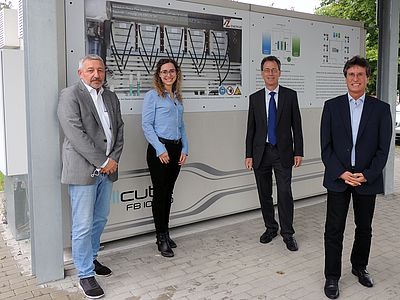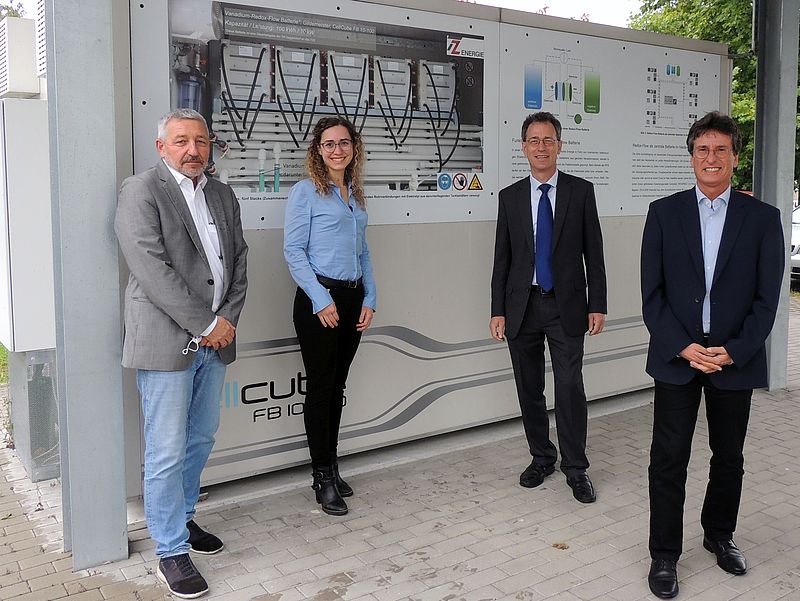
The best of two systems: New EU project “HyFlow” to develop a smart hybrid energy storage system
21.01.2021
HyFlow picture gallery
(from left to right)
Dr Reinhart Schwaiberger (General Manager TZE), Christina Zugschwert (project member HyFlow), Prof. Dr Fritz Pörnbacher (President, Landshut University of Applied Sciences) and Prof. Dr Karl-Heinz Pettinger (project coordinator HyFlow)
Renewable energy sources such as wind power and photovoltaics continuously contribute to electricity generation all over Europe – but their contribution varies as much as the electricity demand of private and public grids. The resulting production and load peaks are a challenge for Europe's energy grids. To meet these demands and reduce dependence on fossil fuels, flexible storage systems tailored to a wide range of applications are needed.
High storage capacity and high power
The HyFlow project addresses this challenge and develops a powerful model of a hybrid energy storage system that can meet high energy and power requirements. The project thus contributes to ensuring the effectiveness and stability of private and public energy grids in the future.
To this end, the researchers want to combine two different systems – a high-performance vanadium redox flow battery and a supercapacitor. "A redox flow battery has a large storage capacity, but can only be charged and discharged slowly. The supercapacitor, on the other hand, has short charging times with low energy density. The hybridisation is intended to create an energy storage system that combines the advantages of both systems: high storage capacity and high power", says Prof. Karl-Heinz Pettinger, Scientific Director of the Landshut University of Applied Sciences Technology Centre for Energy, who coordinates the project.
Powerful, sustainable and cost-effective
In future, the newly developed flexible storage system will be able to balance the power and energy demand flexibly during critical grid conditions, e.g. during high load or generation peaks, whether for seconds or entire days. In these demanding applications, hybridisation leads to more efficient storage systems, with longer lifetimes as well as higher adaptability and potentially lower costs. The new hybrid system works in the most environmentally friendly and sustainable way possible by not using critical resources. Researchers are developing strategies to recycle vanadium for redox flow batteries.
Increasing Europe's competitiveness in the battery sector
The use of optimised components for hybrid systems guarantees security of supply for energy grid systems - with increased current density, efficiency and lifetime. In addition, an innovative management system provides a high level of control and adaptability through computer analytics and control algorithms. The HyFlow project thus supports Europe's competitiveness in the battery sector for stationary storage applications.
Network enormously important
"That Landshut University of Applied Sciences is able to lead and coordinate this ambitious EU project is something very special for us," Pettinger proudly reports. The idea for the project came about in 2019 as part of a conference of the FSTORE research platform, where initial contacts with potential partners were made. The fact that the grant application has now been rated with the highest possible score is "a tribute to the entire team" and shows how important two things are for this success: "Perseverance and a good network."
About the Bavarian Research Alliance (BayFOR) GmbH
The Bavarian Research Alliance provided intensive support for the HyFlow project during the application process and advised on its strategic orientation. As a project partner, BayFOR now also supports the HyFlow consortium in project management and communication activities.
BayFOR is a private organisation promoting Bavaria as a location for science and innovation within the European Research Area. It supports and advises Bavarian scientists and stakeholders from the private sector on European research, development and innovation funds. The focus is directed at the EU’s Framework Programme for Research and Innovation “Horizon Europe”. As a partner in the network for SMEs “Enterprise Europe Network”, BayFOR provides specific advice for SMEs which are interested in EU research and innovation projects. BayFOR is a partner institution in the Bavarian Research and Innovation Agency and is supported by the Bavarian State Ministry of Science and the Arts.
Steckbrief
- Project name: HyFlow (Grant Agreement No. 963550) – Development of a sustainable hybrid storage system based on high power vanadium redox flow battery and supercapacitor – technology
- Funding period: 11/2020 - 10/2023
- Project partners:
Technologiezentrum Energie (TZE), Landshut University of Applied Sciences, Germany
Pinflow energy storage s.r.o., Czech Republic
Fraunhofer Institut für Chemische Technologie, Germany
Skolkovo Institute of Science and Technology, Russia
C2C-NewCap, Portugal
Epic Power, Spain
Karlsruher Institut für Technologie, Germany
Freqcon, Germany
Energieinstitut Linz, Austria
Università di Bologna, Italy
Bavarian Research Alliance, Germany - Project coordination: Prof. Dr Karl-Heinz Pettinger (TZE), Landshut University of Applied Sciences
- Funding Programme: Horizon 2020
- Budget: 3.9 million euros
- Funding: European Commission
Contact Landshut University of Applied Sciences
Prof. Dr Karl-Heinz Pettinger
Scientific Director of the Landshut University of Applied Sciences Technology Centre for Energy
Phone: +49 (0)871 506 276
Email: karl-heinz.pettinger@no-spam-pleasehaw-landshut.de
Thomas Kolbinger
PR Officer
Phone: +49 (0)871 506 191
Email: pressestelle@no-spam-pleasehaw-landshut.de
Contact BayFOR

Dr. Daniel Kießling
Scientific Officer Information & Communication Technologies |
Engineering & Natural Sciences
Phone: +49 911 50715-920
Email: kiessling@no-spam-pleasebayfor.org

MBA Gabriela Blumberger
Scientific Officer Information & Communication Technologies | Engineering & Natural Sciences and Project Manager
Phone: +49 89 9901888-132
Email: blumberger@no-spam-pleasebayfor.org

Emmanuelle Rouard
Head of Public Relations
Phone: +49 89 9901888-111
Email: rouard@no-spam-pleasebayfor.org






